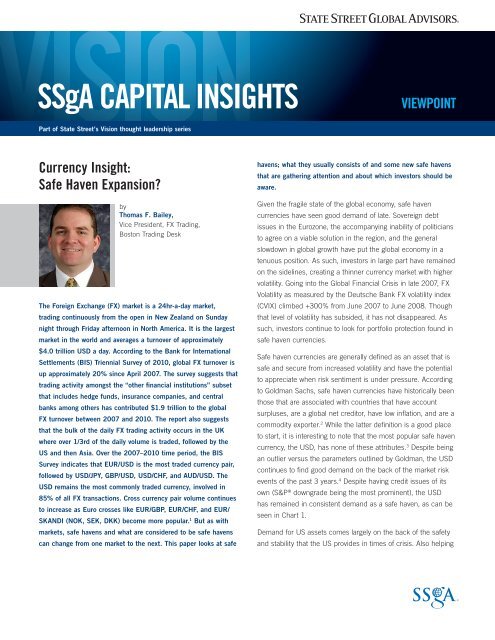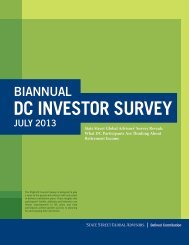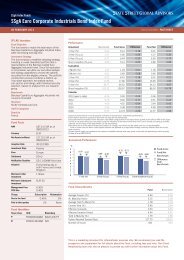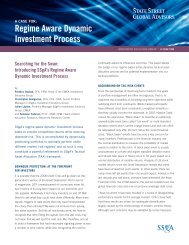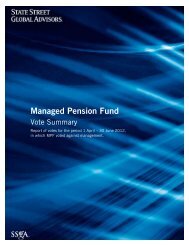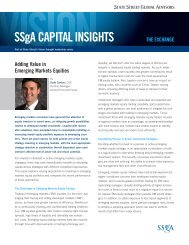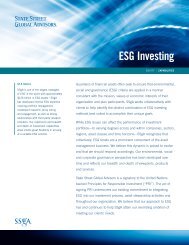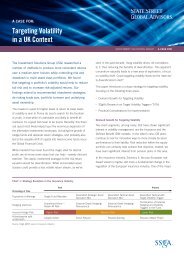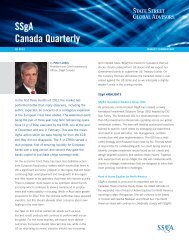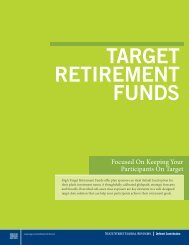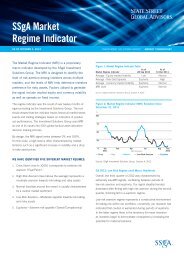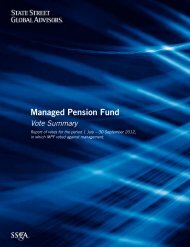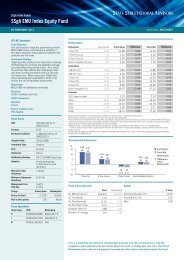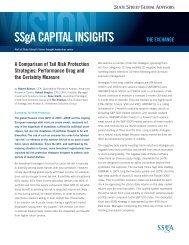Safe Haven Currency Overview - State Street Global Advisors
Safe Haven Currency Overview - State Street Global Advisors
Safe Haven Currency Overview - State Street Global Advisors
Create successful ePaper yourself
Turn your PDF publications into a flip-book with our unique Google optimized e-Paper software.
SSgA CAPITAL INSIGHTS VIEWPOINT<br />
Part of <strong>State</strong> <strong>Street</strong>’s Vision thought leadership series<br />
<strong>Currency</strong> Insight:<br />
<strong>Safe</strong> <strong>Haven</strong> Expansion?<br />
PHOTO<br />
by<br />
Thomas F. Bailey,<br />
Vice President, FX Trading,<br />
Boston Trading Desk<br />
The Foreign Exchange (FX) market is a 24hr-a-day market,<br />
trading continuously from the open in New Zealand on Sunday<br />
night through Friday afternoon in North America. It is the largest<br />
market in the world and averages a turnover of approximately<br />
$4.0 trillion USD a day. According to the Bank for International<br />
Settlements (BIS) Triennial Survey of 2010, global FX turnover is<br />
up approximately 20% since April 2007. The survey suggests that<br />
trading activity amongst the “other financial institutions” subset<br />
that includes hedge funds, insurance companies, and central<br />
banks among others has contributed $1.9 trillion to the global<br />
FX turnover between 2007 and 2010. The report also suggests<br />
that the bulk of the daily FX trading activity occurs in the UK<br />
where over 1/3rd of the daily volume is traded, followed by the<br />
US and then Asia. Over the 2007–2010 time period, the BIS<br />
Survey indicates that EUR/USD is the most traded currency pair,<br />
followed by USD/JPY, GBP/USD, USD/CHF, and AUD/USD. The<br />
USD remains the most commonly traded currency, involved in<br />
85% of all FX transactions. Cross currency pair volume continues<br />
to increase as Euro crosses like EUR/GBP, EUR/CHF, and EUR/<br />
SKANDI (NOK, SEK, DKK) become more popular. 1 But as with<br />
markets, safe havens and what are considered to be safe havens<br />
can change from one market to the next. This paper looks at safe<br />
havens; what they usually consists of and some new safe havens<br />
that are gathering attention and about which investors should be<br />
aware.<br />
Given the fragile state of the global economy, safe haven<br />
currencies have seen good demand of late. Sovereign debt<br />
issues in the Eurozone, the accompanying inability of politicians<br />
to agree on a viable solution in the region, and the general<br />
slowdown in global growth have put the global economy in a<br />
tenuous position. As such, investors in large part have remained<br />
on the sidelines, creating a thinner currency market with higher<br />
volatility. Going into the <strong>Global</strong> Financial Crisis in late 2007, FX<br />
Volatility as measured by the Deutsche Bank FX volatility index<br />
(CVIX) climbed +300% from June 2007 to June 2008. Though<br />
that level of volatility has subsided, it has not disappeared. As<br />
such, investors continue to look for portfolio protection found in<br />
safe haven currencies.<br />
<strong>Safe</strong> haven currencies are generally defined as an asset that is<br />
safe and secure from increased volatility and have the potential<br />
to appreciate when risk sentiment is under pressure. According<br />
to Goldman Sachs, safe haven currencies have historically been<br />
those that are associated with countries that have account<br />
surpluses, are a global net creditor, have low inflation, and are a<br />
commodity exporter. 2 While the latter definition is a good place<br />
to start, it is interesting to note that the most popular safe haven<br />
currency, the USD, has none of these attributes. 3 Despite being<br />
an outlier versus the parameters outlined by Goldman, the USD<br />
continues to find good demand on the back of the market risk<br />
events of the past 3 years. 4 Despite having credit issues of its<br />
own (S&P ® downgrade being the most prominent), the USD<br />
has remained in consistent demand as a safe haven, as can be<br />
seen in Chart 1.<br />
Demand for US assets comes largely on the back of the safety<br />
and stability that the US provides in times of crisis. Also helping
SSgA CAPITAL INSIGHTS | SAFE HAVEN CURRENCY OVERVIEW<br />
Chart 1: The DXY<br />
1.6<br />
1.4<br />
1.2<br />
1<br />
0.8<br />
0.6<br />
2007 2008 2009 2010 2011 2012<br />
— AUD Curncy - Last Price (L1) — DXY Curncy - Last Price (R2)<br />
— EUR Curncy - Last Price (L1) — FXJPEMCI Index - Last Price (R2)<br />
Source: Bloomberg.<br />
Past performance is not a guarantee of future results.<br />
drive demand is the understanding that when investor risk<br />
appetite declines, USD-denominated assets remain liquid and<br />
present less of an issue within their respective portfolios. In<br />
these scenarios, the US dollar continues to to be seen a store<br />
of value at a time of great uncertainty in the market; credit<br />
issues and weak fundamentals have not driven investors away.<br />
The liquidity of the US bond markets as well as the US dollar’s<br />
status as the world’s reserve currency will help to keep the US<br />
atop the safe haven list for the foreseeable future.<br />
The CHF and JPY have historically run alongside the USD in<br />
the safe haven equation. The CHF is viewed as a safe haven<br />
due to the stable economic position and good fundamentals<br />
of Switzerland. The CHF as a currency benefits from low<br />
unemployment, low inflation and a strong economy. The<br />
currency is also in demand in times of crisis due to the stability<br />
provided by the Swiss National Bank. The SNB remains<br />
staunchly conservative with not much appetite for quantitative<br />
easing and the recent central bank intervention on the back of<br />
the rapid ascent of the currency takes some of the shine off of<br />
the CHF over the medium term. Nevertheless, in times of crisis,<br />
CHF will remain a benefactor of the flight to safety.<br />
The JPY is considered a safe haven currency largely because<br />
the nation is a global net creditor. By definition, a net creditor<br />
like Japan owns more foreign reserve assets than other nations<br />
own of Japanese assets. Japan is currently the world’s largest<br />
creditor, and is followed by China. 5 This status is certainly<br />
attractive to investors in a time of crisis as it can provide a<br />
feeling of stability in an otherwise uncertain market, given<br />
115<br />
105<br />
95<br />
85<br />
75<br />
65<br />
Japan’s sound economic standing. The fact that the BOJ<br />
followed the SNB on the intervention trail also helped the<br />
Yen’s safe haven status. Near term sentiment is that the JPY<br />
will continue to be supported as a safe haven play. Continuing<br />
sovereign debt issues in the Eurozone during a time of slowing<br />
global growth will lead investors to the JPY as the currency<br />
offers political stability, liquid local markets and offers<br />
favorable fundamentals.<br />
Like the USD, CHF and JPY, the CAD appears to offer a<br />
“safe” investment to investors as well. With the Eurozone<br />
sovereign debt crisis seemingly expanding by the day and the<br />
US downgrade in 2011, CAD bonds may present themselves<br />
as a viable option for investors seeking to add some safety to<br />
their portfolio. In addition, the Loonie attracts interest as a safe<br />
haven based on the security of the Canadian banking sector<br />
(financial regulations) and the strength of the nation’s fiscal<br />
position(budget management, credit rating). However, the fact<br />
that Canadian capital markets remain a fraction of the size of<br />
their peers in the US and Japan 6 may give caution to investors<br />
who are wary of sharp moves in shallow markets. As a result,<br />
the CAD will likely remain a second tier safe haven currency<br />
over the longer term.<br />
GBP and the Scandinavian currencies have also attracted some<br />
attention as possible safe havens for investors. With regard<br />
to Great Britain, declining fundamentals and the prospect of<br />
an increase in quantitative easing will continue to weigh on<br />
the currency and make it less attractive to investors who are<br />
looking for a conservative investment. Of late, the GBP has<br />
remained well-supported as a safe haven currency on the back<br />
of the continuing credit crisis in the Eurozone, declining growth<br />
prospects in the region, and improving data prints.<br />
While Scandinavia certainly provides a place to park an<br />
investment, the market remains a bit skittish and is a bit<br />
reluctant to fully embrace these currencies as true safe haven<br />
alternatives. Concerns seem to center on whether the market<br />
offers sufficient depth during times of volatility. After all, the BIS<br />
estimates that the daily traded volume of the Norwegian Krona<br />
is only 1.3% of the $4 trillion traded daily. To be effective, safe<br />
havens need to provide a reduction in volatility but also deep<br />
markets; in other words, market depth matters.<br />
<strong>Safe</strong> haven currencies are not the only option in this market,<br />
however. Investors may also consider highly rated sovereign<br />
debt as a safe haven as well. If we consider highly rated<br />
2
SSgA CAPITAL INSIGHTS | SAFE HAVEN CURRENCY OVERVIEW<br />
sovereign debt first, it’s clear that German Bunds and US<br />
Treasuries are generally the most attractive safe havens in this<br />
sector. In the current environment where investors are spooked<br />
on the back of the Eurozone crisis (defined by increasing debt,<br />
declining growth and default concerns), being long German<br />
Bunds with CDS protection may present itself as an attractive<br />
investment. In this case, investors know what they are getting<br />
and have some peace of mind of protection. 7 Historically,<br />
the price of US equities and the price of US Treasuries have<br />
had a negative correlation. But for investment managers, US<br />
Treasuries have been, and can be, used to help soften the blow<br />
of declining securities within a given portfolio. In general terms,<br />
when equities declined over the past decade, US Treasuries<br />
rose. Specifically, when the S&P declined by 14% in Q3 2011,<br />
and as a result, realized their biggest loss in two decades, US<br />
treasuries realized their second biggest rally during the same<br />
time span. 8<br />
But what about commodities as a safe haven? Gold has also<br />
attracted some interest of late. After all, declining global markets<br />
and lingering uncertainty mainly due to inflationary concerns<br />
on back of global QE initiatives has spurned demand for the<br />
precious metal. However, the precious metal is likely too volatile<br />
of an asset for investors to truly consider it a safe haven option.<br />
When global assets are in decline, investors seem to flock to the<br />
safest of the safe with US Treasuries and German Bunds—gold<br />
falls into the second tier category when it comes to safe haven<br />
demand.<br />
The SSgA <strong>Global</strong> FX trading desks execute FX wherever there<br />
is an available 3rd party FX market. These include the G20<br />
currencies and all emerging markets (EEMA, ASIA EM, LATAM<br />
EM) currencies where available. Based on figures over the last<br />
3 years, the SSgA <strong>Global</strong> FX desk concluded that they execute<br />
approximately $760 billion annually across the desks in London,<br />
Hong Kong, and Boston. This type of operation helps give us<br />
the ability to see these ebbs and flows into both traditional and<br />
emerging safe haven options.<br />
In the end, safe havens have risen in popularity on the back of<br />
the rising correlations within the recent crises’ global markets<br />
have endured over the past 3 years. While it is likely that we<br />
may see some atypical safe haven currencies sought after in<br />
future times of crisis, we believe the feeling in the market is that<br />
the major safe haven currencies will remain the USD, CHF and<br />
JPY. We believe highly rated sovereign debt like German Bunds<br />
and US Treasuries will also continue to remain in demand in<br />
time of increased market stress.<br />
1 Triennial Central Bank Survey, Detailed Final Report on FX Activity, December 2010<br />
2 Goldman Sachs, <strong>Global</strong> Markets Daily, September 28, 2011<br />
3 Ibid<br />
4 These include the Lehman collapse, the first signs of the need for a Greek bailout,<br />
and more recently, the Eurozone contagion fears associated with Greece bailout<br />
5 Reuters.com, 5/21/12<br />
6 BMO FX Commentary, 5/31/12<br />
7 Bank of America/Merrill Lynch “Curse of the Vanishing <strong>Safe</strong> <strong>Haven</strong>s”, October 19, 2011<br />
8 Goldman Sachs, <strong>Global</strong> Markets Daily, September 28, 2011<br />
3
SSgA CAPITAL INSIGHTS | SAFE HAVEN CURRENCY OVERVIEW<br />
SSgA <strong>Global</strong> Entities<br />
Australia: <strong>State</strong> <strong>Street</strong> <strong>Global</strong> <strong>Advisors</strong>, Australia, Limited (ABN 42 003 914 225) is the holder of an Australian Financial Services Licence (AFSL Number 238276). Registered office: Level 17, 420 George<br />
<strong>Street</strong>, Sydney, NSW 2000, Australia Telephone: +612 9240-7600 • Facsimile: +612 9240-7611. Belgium: <strong>State</strong> <strong>Street</strong> <strong>Global</strong> <strong>Advisors</strong> Belgium, Office Park Nysdam, 92 Avenue Reine Astrid, B-1310<br />
La Hulpe, Belgium. Telephone: 32 2 663 2036 • Facsimile: 32 2 672 2077. Belgium is a branch of <strong>State</strong> <strong>Street</strong> <strong>Global</strong> <strong>Advisors</strong> Limited. Canada: <strong>State</strong> <strong>Street</strong> <strong>Global</strong> <strong>Advisors</strong>, Ltd., 770 Sherbrooke<br />
<strong>Street</strong> West Suite 1200, Montreal, Quebec H3A 1G1 Canada and 30 Adelaide <strong>Street</strong> East, Suite 500, Toronto, Ontario, M5C 3G6 Canada. Dubai: <strong>State</strong> <strong>Street</strong> Bank and Trust Company (Representative<br />
Office), Suite 404 4th Floor, Building 4, Emaar Square, Dubai, United Arab Emirates. Telephone: +971 (0)4-4372800 • Facsimile: +971 (0)4-4372818. France: <strong>State</strong> <strong>Street</strong> <strong>Global</strong> <strong>Advisors</strong> France.<br />
Authorised and regulated by the Autorité des Marchés Financiers. Registered with the Register of Commerce and Companies of Nanterre under the number 412 052 680. Registered office: Immeuble<br />
Défense Plaza, 23-25 rue Delarivière-Lefoullon, 92064 Paris La Défense Cedex, France. Telephone: (+33) 1 44 45 40 00 • Facsimile: (+33) 1 44 45 41 92. Germany: <strong>State</strong> <strong>Street</strong> <strong>Global</strong> <strong>Advisors</strong> GmbH,<br />
Brienner Strasse 59, D-80333 Munich. Telephone +49 (0)89-55878-400 • Facsimile +49 (0)89-55878-440. Hong Kong: <strong>State</strong> <strong>Street</strong> <strong>Global</strong> <strong>Advisors</strong> Asia Limited, 68/F, Two International Finance<br />
Centre, 8 Finance <strong>Street</strong>, Central, Hong Kong • Telephone: +852 2103-0288 • Facsimile: +852 2103-0200. Japan: <strong>State</strong> <strong>Street</strong> <strong>Global</strong> <strong>Advisors</strong>, Japan, 9-7-1 Akasaka, Minato-ku, Tokyo Telephone +813<br />
4530 7380. Financial Instruments Business Operator, Kanto Local Financial Bureau (Kinsho #345). Japan Securities Investment Advisers Association, Investment Trust Association, Japan Securities<br />
Dealers’ Association. Ireland: <strong>State</strong> <strong>Street</strong> <strong>Global</strong> <strong>Advisors</strong> Ireland Limited is regulated by the Central Bank of Ireland. Incorporated and registered in Ireland at Two Park Place, Upper Hatch <strong>Street</strong>,<br />
Dublin 2. Registered number 145221. Member of the Irish Association of Investment Managers. Italy: <strong>State</strong> <strong>Street</strong> <strong>Global</strong> <strong>Advisors</strong> Ltd., Sede Secondaria di Milano - Via dei Bossi, 4 20121 Milan,<br />
Italy. Telephone: +39 02 32066 100 • Facsimile: +39 02 32066 155. Netherlands: <strong>State</strong> <strong>Street</strong> <strong>Global</strong> <strong>Advisors</strong> Netherlands, Adam Smith Building, Thomas Malthusstraat 1-3, 1066 JR Amsterdam,<br />
Netherlands. Telephone: 31 20 7085600 • Facsimile 31 20 7085601, SSgA Netherlands is a branch of <strong>State</strong> <strong>Street</strong> <strong>Global</strong> <strong>Advisors</strong> Limited. Singapore: <strong>State</strong> <strong>Street</strong> <strong>Global</strong> <strong>Advisors</strong> Singapore Limited,<br />
168, Robinson Road, #33-01 Capital Tower, Singapore 068912 (Company Reg. No: 200002719D), Telephone: +65 6826-7500 • Facsimile: +65 6826-7501. Switzerland: <strong>State</strong> <strong>Street</strong> <strong>Global</strong> <strong>Advisors</strong><br />
AG, Beethovenstr. 19, CH-8027 Zurich. Telephone +41 (0)44 245 70 00 • Facsimile +41 (0)44 245 70 16. United Kingdom: <strong>State</strong> <strong>Street</strong> <strong>Global</strong> <strong>Advisors</strong> Limited. Authorised and regulated by the<br />
Financial Services Authority. Registered in England. Registered No. 2509928. VAT No. 5776591 81. Registered office: 20 Churchill Place, Canary Wharf, London, E14 5HJ. Telephone: 020 3395 6000<br />
• Facsimile: 020 3395 6350. United <strong>State</strong>s: <strong>State</strong> <strong>Street</strong> <strong>Global</strong> <strong>Advisors</strong>, One Lincoln <strong>Street</strong>, Boston, MA 02111-2900.<br />
Web: www.ssga.com<br />
The views expressed in this material are the views of Thomas Bailey through the period ended September 30, 2012 and are subject to change based on market and other conditions. The information<br />
provided does not constitute investment advice and it should not be relied on as such. All material has been obtained from sources believed to be reliable, but its accuracy is not guaranteed.<br />
This document contains certain statements that may be deemed forward-looking statements. Please note that any such statements are not guarantees of any future performance and actual results<br />
or developments may differ materially from those projected. Past performance is not a guarantee of future results.<br />
Investing involves risk including the risk of loss of principal.<br />
Investing in foreign domiciled securities may involve risk of capital loss from unfavorable fluctuation in currency values, withholding taxes, from differences in generally accepted accounting principles<br />
or from economic or political instability in other nations.<br />
Investments in emerging or developing markets may be more volatile and less liquid than investing in developed markets and may involve exposure to economic structures that are generally less<br />
diverse and mature and to political systems which have less stability than those of more developed countries.<br />
The information provided does not constitute investment advice and it should not be relied on as such. It should not be considered a solicitation to buy or an offer to sell a security. It does not<br />
take into account any investor’s particular investment objectives, strategies, tax status or investment horizon. You should consult your tax and financial advisor. All material has been obtained from<br />
sources believed to be reliable. There is no representation or warranty as to the accuracy of the information and <strong>State</strong> <strong>Street</strong> shall have no liability for decisions based on such information.<br />
Investing in commodities entail significant risk and is not appropriate for all investors. Commodities investing entail significant risk as commodity prices can be extremely volatile due to wide range<br />
of factors. A few such factors include overall market movements, real or perceived inflationary trends, commodity index volatility, international, economic and political changes, change in interest<br />
and currency exchange rates.<br />
All information is from SSgA unless otherwise noted and has been obtained from sources believed to be reliable, but its accuracy is not guaranteed. There is no representation or warranty as to the<br />
current accuracy, reliability or completeness of, nor liability for, decisions based on such information and it should not be relied on as such.<br />
Standard & Poor’s (S&P) S&P Indices are a registered trademark of Standard & Poor’s Financial Services LLC.<br />
© 2012 STATE STREET CORPORATION ID1579-INST-3468 1012 Exp. Date: 10/31/2013<br />
4


